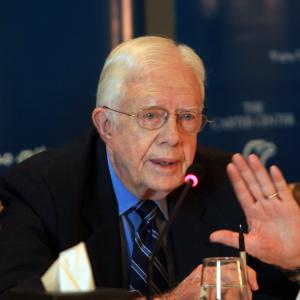
Jeremy Courtney lives in Iraq, pursuing peace and providing lifesaving heart surgeries to Iraqi children as founder of the Preemptive Love Coalition. All views are his own. Join the dialogue on Twitter @JCourt.
Posts By This Author
There's No Such Thing as a Pro-Life Sneak Attack: Why Donald Trump Is Wrong About Mosul
When Donald Trump looks at Mosul, a city suffocated by ISIS, he sees missed opportunity. On the campaign trail and in debates, he's expressed anger and dismay that military forces announced the operation to liberate Mosul months ahead of time. It should have been a sneak attack, he says over and over.
Behind #WeAreN: 'If One Group Is Marked, We're All Marked'
When I first saw Americans joining in solidarity with Iraqi Christians through the #WeAreN hashtag and protest campaign, I was encouraged. Our team at Preemptive Love Coalition had been sounding the alarm about the targeted persecution of minorities in Iraq through private emails and social media messages for weeks, in between making urgent appeals in our effort to provide lifesaving heart surgeries for children amid the violence.
Most of our efforts were largely unsuccessful before the “Islamic State” gave Mosul’s Christians an ultimatum to (1) convert to Islam; (2) pay a submission tax; or (3) “face the sword.”
After Islamist militants began marking the homes of Christians in red paint with the Arabic letter “N” (Nazarene) for extermination or expropriation, we tried again to use our proximity to the problem in Iraq to provoke our friends in America to pay attention by tagging a photo “#WeAreN,” in which I had symbolically marked myself with an Arabic “N.”
But it was not strictly an act of solidarity with Iraqi Christians. We had the targeting of Turkmen, Yezidi, Shabak, and even Sunni Muslims in view, as well. #WeAreN was more about the marking of Christians; less about the marking of Christians.
Muslims and minorities across Iraq immediately sensed the gravity of the tactics deployed by the Islamic State: if one group is marked, we are all marked. If we stand by in silence today while others are marked for extinction, our time will come, and there will be no one left to stand for us.
In response, Muslims across Iraq joined together in protest, prayer, and viral photographs saying “We are Iraqi. We are Christians.”
Jimmy Carter Tries to Pull the Log from America’s Eye
Earlier this week, former President Jimmy Carter critiqued the United States for its (read: our) deteriorating record on human rights and rule of law in the last decade.
But those responding to Carter's New York Times Op-Ed (“A Cruel and Unusual Record”) have largely missed his main point. In the spirit of the Sermon on the Mount, Carter wants to lead America in removing the log from our own eye in hopes of honoring God and regaining our position as champions of human rights and rule of law.
During his visit to Cairo for the Egyptian elections, Carter met with the Grand Imam of Al Azhar — the most authoritative voice in Sunni Islam. Discussing human rights, religion, and the historic election that was taking place outside, Carter exhibited a rare humility in articulating his convictions. I feel that a whole range of human interactions might be improved if we would each remove the log from our own eye before trying to remove the speck from our neighbor’s.
Sitting with women’s rights activists and top Christian leadership; in private briefings and press conferences, this self-critique proved central to Carter’s efforts to build trust and advance human rights in Egypt and around the world.
After decades of lectures from the White House and U.S. State Department, much of the world has grown tired of the West’s wagging finger and “holier than thou” attitude. There may have been an era when this posture had a greater effect, but the U.S. has lost too much of its moral credibility in the wake of Abu Ghraib, Guantanamo, and drone strikes carried out against the President Obama's “Hit List”.


